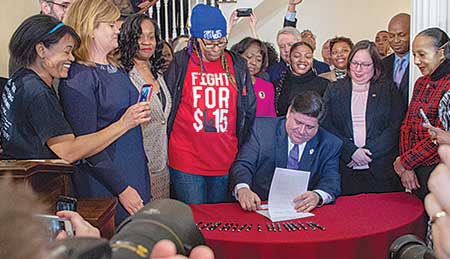By CARL GREEN
Illinois Correspondent

Springfield, IL – By now, Illinois’ lowest-paid workers should be earning at least $10 an hour. The minimum wage was increased to that amount from $9.25 on July 1 under a law passed by the Legislature and signed by Gov. J.B. Pritzker last year.
The increase follows a $1 raise, from $8.25, that took effect in January of this year and was the state’s first minimum wage increase in a decade.
So an eight-hour day’s work that was valued at $66 under the old minimum wage a year ago is now worth $80, almost an 18 percent increase. In the Chicago region, the minimum wage is now up to $14 an hour in the city and $13 in surrounding areas.
Sen. Christopher Belt (D-Centreville), one of the supporters of the increase, said the raise will help where it counts – for workers at essential places such as grocery stores and gas stations.
“Our low-wage essential workers deserve to see a pay increase for their labor during the COVID-19 crisis,” Belt said. “And the many Illinoisans who have been laid off during the pandemic can count on a livable wage when they return to work.”
A LAW THAT KEEPS GIVING
The same legislation that raised the minimum to $10 – Senate Bill 1 of 2019 – will continue raising the minimum wage by $1 each Jan. 1 until it reaches $15 an hour in 2025.
“I promised my constituents a livable minimum wage, and I plan on keeping that promise,” Belt said. “It had been a decade since Illinois workers received a wage increase. We can’t stall any longer.”
Small businesses with fewer than 50 employees may receive a tax credit to help offset the higher wages.
Business owners said it’s a bad time to force a wage increase – just when they are coping with the coronavirus. The Illinois Chamber of Commerce asked that the raise be delayed to keep businesses from closing altogether.
But Labor leaders, such as Laborers’ Midwest Region Director of Government Affairs Sean Stott, noted that raises for the lowest-paid workers reliably bring up the whole economy.
“It’s going to provide working people with just a little bit more disposable income or income that is not disposable but is required to make ends meet,” he said, in an interview with the State Journal-Register newspaper in Springfield.
“If I’m out of poverty, I have more ability to get off government subsidies, and so then I’m going to spend more money in the economy.”
Businesses will eventually pass the higher costs to customers in the form of higher prices, he noted.
NOT JUST FOR KIDS
Stott also disputed the common notion that the minimum wage is mainly paid to kids working for a little spending money.
“The majority of workers who earn minimum wage are not going to be 17-year-old kids working after school or in the summer time,” he said. “They are people like the ones we represent, who provide care of the elderly or who are working in industrial settings where they’re punching a clock and working eight hours a day, 40 hours a week, 52 weeks a year.”
The increases were a key plank in Pritzker’s successful campaign for governor against Republican incumbent Bruce Rauner. As candidate Pritzker said, “If you live in this state and put in a hard day’s work, you should be able to afford putting a roof over your head and food on the table.”
CHECK YOUR CHECK
Meanwhile, the Illinois Department of Labor urged minimum-wage workers to make sure they’re getting the raise.
“While IDOL fully expects employers to abide by the new minimum wage, it is important for workers to inspect their checks to make sure they reflect the increase,” said Michael Kleinik, director of the department.
The new law will also increase hourly wages for tipped employees and for workers under 18 who work fewer than 650 hours a year.
The tipped employees are now to be paid at least 60 percent of the minimum wage, or $6 an hour before tips. The youth rate is now $8 an hour. Those rates will also increase with the next five Jan. 1 minimum wage increases.


